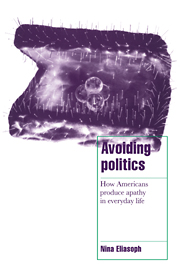Book contents
- Frontmatter
- Contents
- Acknowledgments
- 1 The mysterious shrinking circle of concern
- 2 Volunteers trying to make sense of the world
- 3 “Close to home” and “for the children”: trying really hard not to care
- 4 Humor, nostalgia, and commercial culture in the postmodern public sphere
- 5 Creating ignorance and memorizing facts: how Buffaloes understood politics
- 6 Strenuous disengagement and cynical chic solidarity
- 7 Activists carving out a place in the public sphere for discussion
- 8 Newspapers in the cycle of political evaporation
- 9 The evaporation of politics in the US public sphere
- Appendix 1 Class in the public sphere
- Appendix 2 Method
- Notes
- References
- Index
- Titles in the serious
3 - “Close to home” and “for the children”: trying really hard not to care
Published online by Cambridge University Press: 17 November 2009
- Frontmatter
- Contents
- Acknowledgments
- 1 The mysterious shrinking circle of concern
- 2 Volunteers trying to make sense of the world
- 3 “Close to home” and “for the children”: trying really hard not to care
- 4 Humor, nostalgia, and commercial culture in the postmodern public sphere
- 5 Creating ignorance and memorizing facts: how Buffaloes understood politics
- 6 Strenuous disengagement and cynical chic solidarity
- 7 Activists carving out a place in the public sphere for discussion
- 8 Newspapers in the cycle of political evaporation
- 9 The evaporation of politics in the US public sphere
- Appendix 1 Class in the public sphere
- Appendix 2 Method
- Notes
- References
- Index
- Titles in the serious
Summary
Sherry's speech came out in a jerky, halting rhythm when she told me, in an interview, that the issue of nuclear war was “not close to home”:
If it's not something that.
Affects.
My.
Family. [each word said separately]
I don't see.
Me.
Doing it.
[speeds up] And-I-mean-of-course-nuclear-war-could-affect-my-heheh-family.
But I still don't – If it's not local, I mean,
I'm more.
Maybe it's small minded.
Sherry knew it was a problem, but did not want to know.
Volunteers strenuously insisted that all of their efforts were motivated by self-interest. Over and over, they repeated that all people, themselves included, get involved in community affairs only out of “self-interest,” “for their own children,” on issues that are “close to home” and “affect them personally.” In appearing self-interested, volunteers seemed at first glance to confirm the theory that people are “rational actors,” that is, people who will bestir them-selves to community action only when they think that time invested will be worth the personal payoff, and only when they cannot hitch a “free ride” to that personal payoff on someone else's back. But, as we heard in the last chapter, volunteers wanted to do more than live in a paradise engineered by someone else; they wanted to reassure themselves, through their own actions, that the world makes sense because good citizens really can make a difference on issues that matter. Volunteers were, above all, “moral” – in the sense of meaning-making – actors, rather than “rational” actors. The phrases “close to home” and “for the children” worked hard; they were pivotal in allowing volunteers to maintain that feeling that the world made sense.
- Type
- Chapter
- Information
- Avoiding PoliticsHow Americans Produce Apathy in Everyday Life, pp. 64 - 84Publisher: Cambridge University PressPrint publication year: 1998



